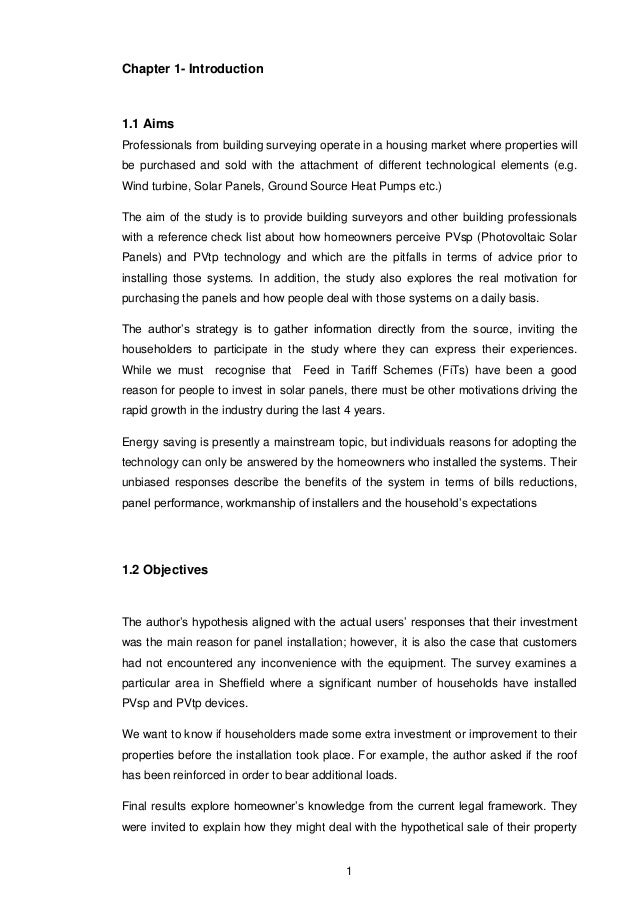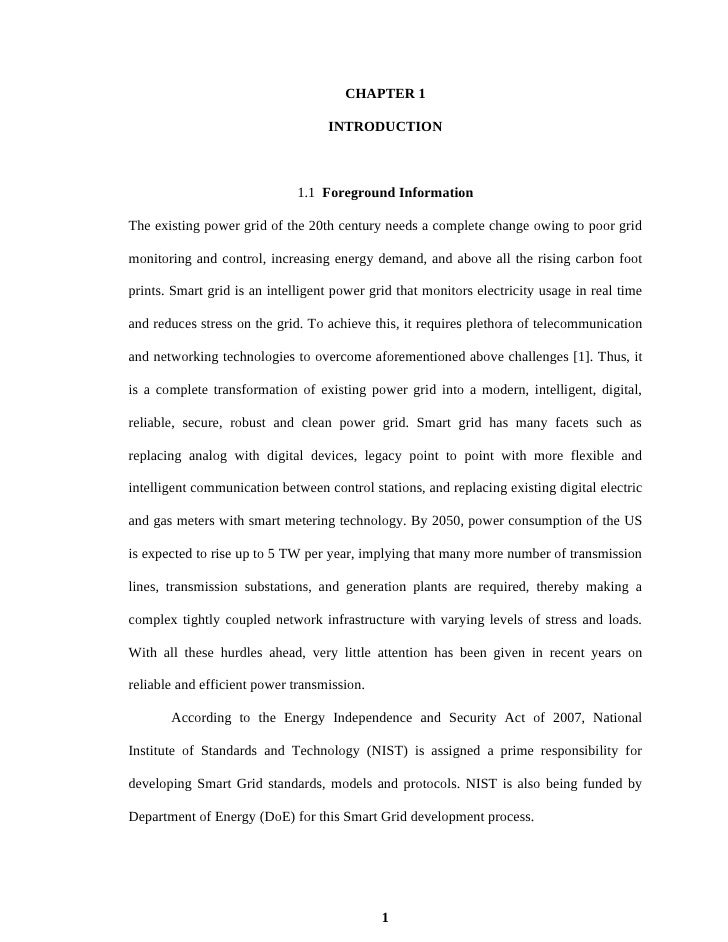
The PhD is an advanced research degree that requires original and substantive contributions to the advancement of our understanding of earth and environmental systems. Graduates of the PhD program are prepared for careers that involve conducting independent research and teaching in academia, government, and industry Jun 01, · A decrease in the energy intensity of buildings and industry. (2) A shift from fossil fuels toward electricity, e.g. for transportation and space heating. (3) Clean power generation by a massive shift toward renewable energies, comprising wind energy, Jul 14, · May I suggest the following: The wide adoption of renewable energy will depend on availability of fuel and cost of investement. Availability of different types of fuel is still open, life cycle
Earth and Environmental Sciences
The Department of Electrical and Electronic Engineering has an international reputation for world-leading research in areas such as mobile and wireless communication systems, microelectronics, electrical energy management, photonics and optical communications, artificial vision and image analysis, and high-performance networks. It collaborates with more than 30 industrial organisations and has been successful in phd thesis on renewable energy substantial research funding from diverse sources in the UK, Europe and overseas.
The department has a strong research profile, with 30 phd thesis on renewable energy staff, more than 60 postgraduate research students and 30 full-time research assistants contributing to numerous research projects. The quality of our research is recognised nationally and internationally.
Fees are subject to an annual review. For programmes that last longer than one year, please budget for up to a five per cent increase in fees each year. Find out more about tuition fees. University of Bristol students and graduates can benefit from a ten per cent reduction in tuition fees for postgraduate study.
Check your eligibility for an alumni scholarship. A number of funded studentships are available each year, supported by research council, industry, University or other funds. View the faculty website for a list of currently available funded projects or visit jobs. View Information on funding postgraduate study for prospective UK, EU and international postgraduate students.
Further information on funding for prospective UK, EU and international postgraduate students. Applicants without a masters qualification may be considered on an exceptional basis, provided they hold a first-class undergraduate degree. Please note, phd thesis on renewable energy, acceptance will also depend on evidence of readiness to pursue a research degree. See international equivalent qualifications on the International Office website. If English is not your first language, you need to meet this profile level: Profile E Further information about English language requirements and profile levels.
Read the programme admissions statement for important information on entry requirements, the application process and supporting documents required. Admissions statement. Modern communication systems and networks play a vitally important role in nearly every aspect of our society.
The CSN group has been at the forefront of research for more than 25 years and its pioneering work impacts the energy, healthcare, transport, phd thesis on renewable energy, semiconductor and telecommunications sectors. The group specialises in end-to-end wireless connectivity, while focusing on the following activities:. The group places a growing emphasis on the efficient management of electrical energy phd thesis on renewable energy focuses its research in two main areas:.
Vision science research at Bristol is at the forefront of the study of human and animal vision, artificial vision systems and image analysis. The Visual Information Laboratory stimulates interdisciplinary research to promote the future development of this field.
The group's core research areas of coding and transport also include new parametric coding and analysis methods, distributed video coding and image fusion. The group's activities fall into three main areas:. Photonics, the science of light, underpins many recent developments in communications, solar power, lighting, data storage and displays, and could even lead to a quantum revolution in computing.
Optical fibre communications form the backbone of all land-based communications. The Photonics group pursues research topics that lead to cheaper and faster information and communication technologies, inexpensive sensors to revolutionise healthcare, and new methods of harvesting renewable energy. Cutting-edge research focuses on three key areas:. The Microelectronics Research Group is a team of academic experts in computer architecture, design verification, fault tolerance, reconfigurable technologies and high performance computing.
The group brings together researchers from a range of academic disciplines to address its primary research theme of energy-aware computing, with expertise across the entire system stack, from transistors to software applications. Students from this programme typically go into a variety of careers, including working in research or academic roles at universities in the UK and overseas.
A large number of students go on to work in industry. Dr Simon ArmourSenior Lecturer in Software RadioAdvanced wireless communications.
Professor Mark BeachProfessor of Radio Systems EngineeringAdvanced wireless access. Dr Souheil Ben SmidaLecturer in Electrical and Electronic EngineeringAdvanced architectures of highly efficient wireless transmitters; microwave instrumentation for medical application. Professor Ian CraddockProfessor in the Department of Electrical and Electronic EngineeringElectromagnetics and antenna design.
Dr Angela DoufexiReader in Wirless NetworksAdvanced wireless communications, phd thesis on renewable energy. Dr Francesco FornettiTeaching Fellow in Electrical and Electronic EngineeringWide bandgap semiconductor devices and materials. Professor Martin J CryanProfessor of Applied Electromagnetics and PhotonicsPhotonic crystals and wireless-over-fibre. Dr Evangelos MelliosLecturer in Electrical and Electronic EngineeringAntennas, radiowave propagation and Phd thesis on renewable energy system-level analysis.
Dr Kevin MorrisReader in Radio Frequency EngineeringEfficient radio amplifier and system design. Dr George OikonomouLecturer. Dr Robert PiechockiReader in Wireless ConnectivityCommunications theory. Dr Paul WarrSenior Lecturer in Electrical and Electronic EngineeringRadio frequency enabling technologies.
Dr Steve BurrowReader in Aircraft Systems. Dr David DrurySenior Lecturer in Electrical EngineeringElectrical energy management and control. Dr Saeed JahdiLecturer. Professor Phil MellorHead of Group Professor of Electrical EngineeringElectrical machines; power electronics and control. Dr Nick SimpsonLecturer in Electrical Engineering. Dr Bernard Starkphd thesis on renewable energy, Reader in Electrical and Electronic EngineeringSustainable energy management. Dr Sam WilliamsonLecturer in Electrical and Electronic Engineering.
Dr Xibo YuanReader in Electrical Energy ConversionElectrical energy conversion. Dr Reza NejabatiReader in Optical NetworksFuture internet; network virtualisation service; ultra high-speed networks.
Dr Krishna Coimbatore BalramLecturer in Photonic Quantum Engineering. Professor Martin Cryanphd thesis on renewable energy, Professor of Applied Electromagnetics and PhotonicsPhotonic crystals and wireless-over-fibre. Dr Naim DahnounReader in Teaching and Learning in Signal Processing. Professor Jeremy O'BrienProfessional Research Fellow in Physics and Electrical EngineeringQuantum information.
Dr Ruth OultonSenior LecturerSpintronics. Professor John RarityHead of Group, Professor of Optical Communication SystemsQuantum optics; wavelength scale structures. Professor Judy RorisonProfessor of OptoelectronicsSemiconductor materials and devices, phd thesis on renewable energy. Professor Mark ThompsonProfessor in Quantum PhotonicsPhotonic integrated quantum circuits and photonic devices.
Dr Peter TurnerSenior Lecturer in Quantum Engineering. Professor Siyuan YuProfessor of Photonics Information SystemsIntegrated photonic devices and optical communications. Dr Alin AchimReader in Biomedical Image ComputingStatistical image and video processing, phd thesis on renewable energy.
Dr Dimitris Phd thesis on renewable energySenior Lecturer in Electronic and Electrical EngineeringVideo transmission and error resilience. Dr Dima AldamenLecturer in Computer Science. Dr Tilo BurghardtLecturer in Computer Science. Dr Neill CampbellReader in Computer Science. Professor Walterio Mayol-CuevasProfessor in Robotics, Computer Vision and Mobile Systems.
Professor Majid MirmehdiProfessor of Computer Vision. Watch on-demand recordings from November's virtual open week. School of Computer Science, Electrical and Electronic Engineering, and Engineering Maths Merchant Venturers Building Woodland Road Clifton Bristol BS8 1UB School website: School of Computer Science, Electrical and Electronic Engineering, and Engineering Maths Department website: Department of Electrical and Electronic Engineering.
Find out more about becoming a student at Bristol, applying for a visa and the support we offer to international students. The Bristol Doctoral College facilitates and supports doctoral training and researcher development across the University. You may also be interested in related postgraduate taught programmes. Please see full REF results for the University of Bristol ; in particular, the scores for subject areas 11 and Results are from the most recent UK-wide assessment of research quality, conducted by HEFCE.
More about REF results. Important disclaimer information about our programmes. Electrical and Electronic Engineering Find a programme. Programme overview The Department of Electrical and Electronic Engineering has an international reputation for world-leading research in areas such as mobile and wireless communication systems, microelectronics, electrical energy management, photonics and optical communications, artificial vision and image analysis, and high-performance networks.
Alumni scholarship University of Bristol students and graduates can benefit from a ten per cent reduction in tuition fees for postgraduate study. Self-funded or sponsored students are also very welcome to apply. English language requirements If English is not your first language, you need to meet this profile level: Profile E Further information about English language requirements and profile levels.
Admissions statement Read the programme admissions statement phd thesis on renewable energy important information on entry requirements, the application process and supporting documents required.
Research groups Communication Systems and Networks Modern communication systems and networks play a vitally important role in nearly every aspect phd thesis on renewable energy our society. The group places a growing emphasis on the efficient management of electrical energy and focuses its research in two main areas: More-electric technologies: modelling, design and optimisation of generators, motors and actuators for application in hybrid-electric vehicles and renewable energy conservation.
Low-power systems: design and system-level modelling of vibration energy harvesting devices and power electronic devices and circuits. Visual Information Laboratory Phd thesis on renewable energy science research at Bristol is at the forefront of the study of human and animal vision, artificial vision systems and image analysis.
The group's activities fall into three main areas: Efficient algorithms and architectures Error resilience and transport Image and video content analysis. Photonics Photonics, the science of light, underpins many recent developments in communications, solar power, lighting, data storage and displays, and could even lead to a quantum revolution in computing.
Cutting-edge research focuses on three key areas: Photonic quantum information: secure quantum key distribution, photon sources, quantum gates and integrated quantum circuits. Optical communications: optical transmission and optical switching technologies.
Photonic materials and devices: low dimensional semiconductor quantum structures, photonic device fabrication and characterisation, nanophotonics, solar cells and sensors. Microelectronics The Microelectronics Research Group is a team of academic experts in computer architecture, design verification, fault tolerance, reconfigurable technologies and high performance computing. Careers Students from this programme typically go into a variety of careers, including working in research or academic roles at universities in the UK and overseas.
Breakthroughs in Renewable Energy: Alexander E. MacDonald PhD
, time: 21:38Renewable Energy Systems (RES)

Jun 01, · A decrease in the energy intensity of buildings and industry. (2) A shift from fossil fuels toward electricity, e.g. for transportation and space heating. (3) Clean power generation by a massive shift toward renewable energies, comprising wind energy, The PhD is an advanced research degree that requires original and substantive contributions to the advancement of our understanding of earth and environmental systems. Graduates of the PhD program are prepared for careers that involve conducting independent research and teaching in academia, government, and industry Jul 14, · May I suggest the following: The wide adoption of renewable energy will depend on availability of fuel and cost of investement. Availability of different types of fuel is still open, life cycle

No comments:
Post a Comment